Recommendation Letter For Master Degree
[Your Name]
[Your Title/Position (if applicable)]
[Your Address]
[City, State, Zip Code]
[Your Email Address]
[Today's Date]
[Recipient's Name]
[Recipient's Title (if applicable)]
[University/Institution Name]
[Department/Office]
[Address]
[City, State, Zip Code]
Dear [Recipient's Name],
I am writing this letter to provide my strongest recommendation for [Applicant's Name] in support of [his/her] application for admission to the Master's degree program at [University/Institution Name]. As [his/her] [relationship to the applicant], I have had the pleasure of knowing [him/her] closely and have been continually impressed by [his/her] exceptional qualities and academic achievements.
[Applicant's Name] has been an outstanding student under my supervision, and I have witnessed [his/her] remarkable growth and dedication throughout [his/her] undergraduate studies at [Name of Undergraduate Institution]. [He/She] has consistently demonstrated a deep passion for [his/her] chosen field of study, [mention the field or major], and [his/her] enthusiasm is contagious among [his/her] peers.
Academically, [Applicant's Name] has consistently been at the top of [his/her] class, showcasing a keen intellect, strong analytical skills, and a thirst for knowledge. [He/She] has consistently excelled in coursework and has actively engaged in research and extracurricular activities related to [his/her] area of interest. [His/Her] exceptional grades and academic achievements serve as a testament to [his/her] dedication and discipline in pursuing academic excellence.
Aside from [his/her] academic prowess, [Applicant's Name] possesses outstanding interpersonal skills and is an excellent team player. [He/She] actively participates in group discussions, displaying a willingness to consider diverse perspectives and effectively communicate [his/her] ideas. [His/Her] ability to collaborate and lead within a team setting is truly commendable.
Moreover, [Applicant's Name] exhibits strong research capabilities, having been involved in [mention any research projects or internships], where [he/she] demonstrated the ability to think critically, formulate research questions, and present findings in a clear and concise manner.
I am confident that [Applicant's Name] will make significant contributions to the Master's program and the university community as a whole. [His/Her] passion for [his/her] field, combined with [his/her] strong work ethic and intellectual curiosity, will undoubtedly add value to the academic discourse and foster a positive learning environment.
In conclusion, I wholeheartedly recommend [Applicant's Name] for admission to the Master's degree program at [University/Institution Name]. I am confident that [he/she] will excel in the program and continue to make impressive strides in [his/her] academic and professional pursuits. If you require any further information or have any questions, please feel free to contact me at [Your Email Address] or [Your Phone Number].
Thank you for considering my recommendation. I appreciate your attention to this matter.
Sincerely,
[Your Name]
[Your Title/Position (if applicable)]
[Your Signature (if a physical letter)]
[Your Phone Number] (optional)
Formal Recommendation Letter for Master’s Program
Subject: Recommendation for [Student Name] – Master’s Degree Application
Dear Admissions Committee,
I am pleased to write this recommendation for [Student Name], who has applied for the Master’s program in [Program Name] at [University Name]. I have known [Student Name] for [X years] as [his/her] [Professor/Mentor/Advisor] at [Institution Name].
During this period, [Student Name] has consistently demonstrated exceptional academic performance, critical thinking skills, and dedication to research. [He/She] exhibits strong analytical abilities, effective communication, and the capacity to work both independently and collaboratively.
I am confident that [Student Name] will excel in your program and contribute significantly to the academic community. I strongly recommend [him/her] without reservation.
Sincerely,
[Your Name]
[Title/Position]
[Institution]
[Contact Information]
Heartfelt Recommendation Letter for Master’s Program
Subject: Recommendation for [Student Name]
Dear Members of the Admission Committee,
It is my pleasure to recommend [Student Name] for admission to the Master’s program in [Field] at [University Name]. I have had the privilege of mentoring [Student Name] for the past [X years] and have witnessed [his/her] growth into a highly capable and motivated individual.
[Student Name] combines intellectual curiosity with a strong work ethic and a passion for [specific subject or research area]. [His/Her] enthusiasm for learning, innovative thinking, and collaborative spirit set [him/her] apart from peers.
I wholeheartedly endorse [Student Name] and believe [he/she] will make meaningful contributions to your program.
Warm regards,
[Your Name]
[Position]
[Institution/Organization]
[Contact Information]
Professional Recommendation Letter for a Research-Oriented Master’s Program
Subject: Recommendation for [Student Name] – Research Program
Dear Admissions Committee,
I am writing to recommend [Student Name] for the Master’s program in [Field] at [University Name]. As [his/her] research supervisor in [Department/Lab], I have closely observed [Student Name]’s analytical and problem-solving skills.
[He/She] has demonstrated remarkable capability in conducting independent research, analyzing complex data, and producing insightful reports. [Student Name]’s attention to detail and persistence in pursuing research goals make [him/her] an excellent candidate for a research-intensive Master’s program.
I strongly support [Student Name]’s application and am confident in [his/her] ability to succeed.
Sincerely,
[Your Name]
[Title/Position]
[Institution/Organization]
[Contact Information]
Informal Email Recommendation for Master’s Program
Subject: Recommendation for [Student Name]
Hi [Recipient Name],
I am happy to recommend [Student Name] for your Master’s program in [Field]. I have taught [him/her] in [Course/Subject] at [Institution] and found [him/her] to be an intelligent, curious, and dedicated student.
[Student Name] has shown excellent teamwork and leadership skills, as well as a genuine passion for learning. I am confident [he/she] will thrive in your program.
Best regards,
[Your Name]
[Position]
[Institution]
[Contact Information]
Strong Recommendation Letter Highlighting Leadership Skills
Subject: Recommendation for [Student Name]
Dear Admissions Committee,
I am delighted to recommend [Student Name] for the Master’s program in [Field] at [University Name]. I have had the pleasure of supervising [him/her] in [Project/Department] and can attest to [his/her] leadership, initiative, and dedication.
[Student Name] consistently goes beyond expectations, managing complex tasks, guiding team members, and producing outstanding results. [His/Her] combination of academic excellence and leadership makes [him/her] an ideal candidate for your program.
Sincerely,
[Your Name]
[Position]
[Institution]
[Contact Information]
Recommendation Letter Focusing on Academic Achievements
Subject: Recommendation for [Student Name] – Academic Excellence
Dear Members of the Admission Committee,
I am writing to endorse [Student Name] for your Master’s program in [Field]. As [his/her] instructor for [X courses], I have witnessed [Student Name]’s consistent academic excellence, intellectual rigor, and enthusiasm for learning.
[He/She] demonstrates critical thinking, creativity, and an ability to synthesize complex concepts. I am confident that [Student Name] will thrive academically and contribute meaningfully to your program.
Sincerely,
[Your Name]
[Position]
[Institution]
[Contact Information]
What is a Recommendation Letter for a Master’s Degree and Why It Is Needed
- A formal letter supporting a candidate’s application for a Master’s program.
- Purpose: To provide evidence of the applicant’s academic ability, research potential, and personal qualities.
- Helps the admissions committee assess the suitability of the applicant beyond grades and test scores.
Who Should Write a Recommendation Letter for a Master’s Program
- Professors or academic advisors familiar with the student’s academic work
- Research supervisors who can attest to skills and capabilities
- Employers or internship mentors who can speak to professional experience related to the field
- Individuals able to provide credible, detailed, and positive insights about the applicant
Whom the Recommendation Letter Should Be Addressed To
- Master’s program admissions committees at universities
- Specific department heads if mentioned in the application
- Graduate program coordinators if no specific individual is listed
When a Recommendation Letter is Required
- During the application process for a Master’s degree
- When applying for scholarships or research assistant positions alongside the program
- If requested for program interviews or conditional acceptance evaluations
How to Write and Send a Master’s Recommendation Letter
- Start with a personalized greeting to the admissions committee
- Introduce yourself, your position, and your relationship with the student
- Highlight academic achievements, skills, and personal qualities
- Include specific examples of the applicant’s work, projects, or leadership
- Close with a strong endorsement and your contact information
- Send via email if allowed, or submit through the university application portal
Requirements and Prerequisites Before Writing the Letter
- Detailed knowledge of the applicant’s academic history and achievements
- Access to the student’s CV, transcripts, or portfolio
- Understanding of the Master’s program requirements and expectations
- Time allocated to draft a personalized, thoughtful letter
Formatting Guidelines for Master’s Recommendation Letters
- Length: 1–2 pages (approx. 400–600 words)
- Tone: Professional, formal, and supportive
- Style: Clear, concise, and specific
- Include: Subject line, greeting, introduction, body with examples, strong conclusion, contact details
After Sending a Recommendation Letter
- Confirm submission with the student or university portal
- Be available for follow-up questions or verification
- Maintain a copy for your records
Pros and Cons of Writing a Recommendation Letter
Pros:
- Supports a deserving candidate’s academic and professional growth
- Strengthens the professional relationship between mentor and student
- Opportunity to highlight student achievements
Cons:
- Requires time and effort to write a detailed and thoughtful letter
- Responsibility to provide accurate and fair assessment
- May be difficult if the student does not meet expectations
Compare and Contrast Recommendation Letters With Other Types of Academic References
- Letters vs. Standard References: Letters are detailed, formal, and personalized; references can be brief or standardized
- Alternative: Online recommendation forms submitted through application portals
- Letters provide a richer narrative of the candidate’s strengths and potential
Tricks and Tips for Writing Effective Master’s Recommendation Letters
- Use specific examples of projects, coursework, or research
- Highlight unique qualities that distinguish the student from peers
- Keep the letter organized with clear sections
- Avoid generic phrases; be authentic and precise
- Proofread for grammar, clarity, and professionalism
Common Mistakes to Avoid
- Being too vague or generic
- Overloading with unnecessary personal anecdotes
- Ignoring program requirements or applicant goals
- Missing deadlines for submission
- Using a tone that is either too casual or excessively formal
Essential Elements and Structure of a Master’s Recommendation Letter
- Introduction: Your name, position, and relationship to the student
- Student Overview: Academic performance and personal qualities
- Specific Examples: Projects, research, leadership, or achievements
- Endorsement: Strong recommendation and confidence in student’s success
- Closing: Contact information and invitation for follow-up
Does a Recommendation Letter for a Master’s Degree Require Attestation or Authorization
- Typically does not require formal attestation
- Should be written on official institutional letterhead if possible
- Signature and position of the recommender provide credibility

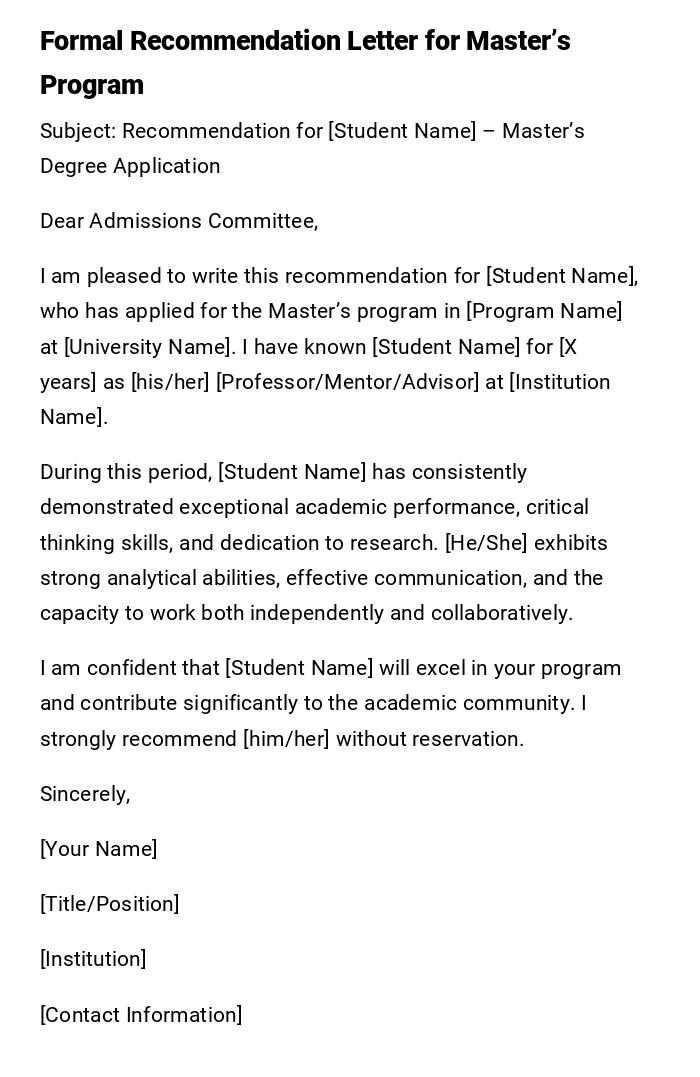
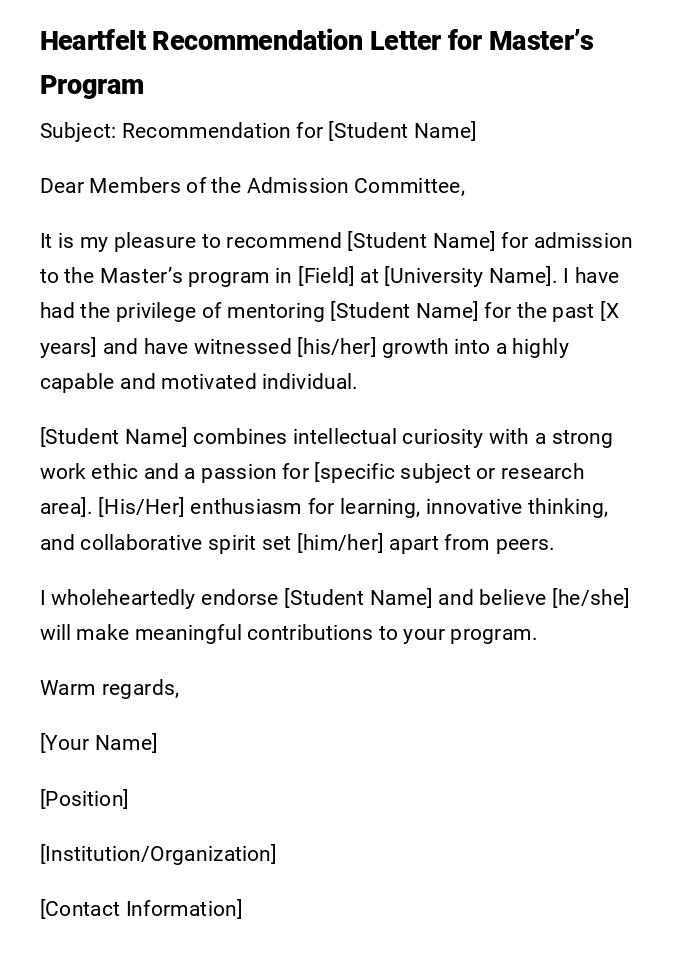
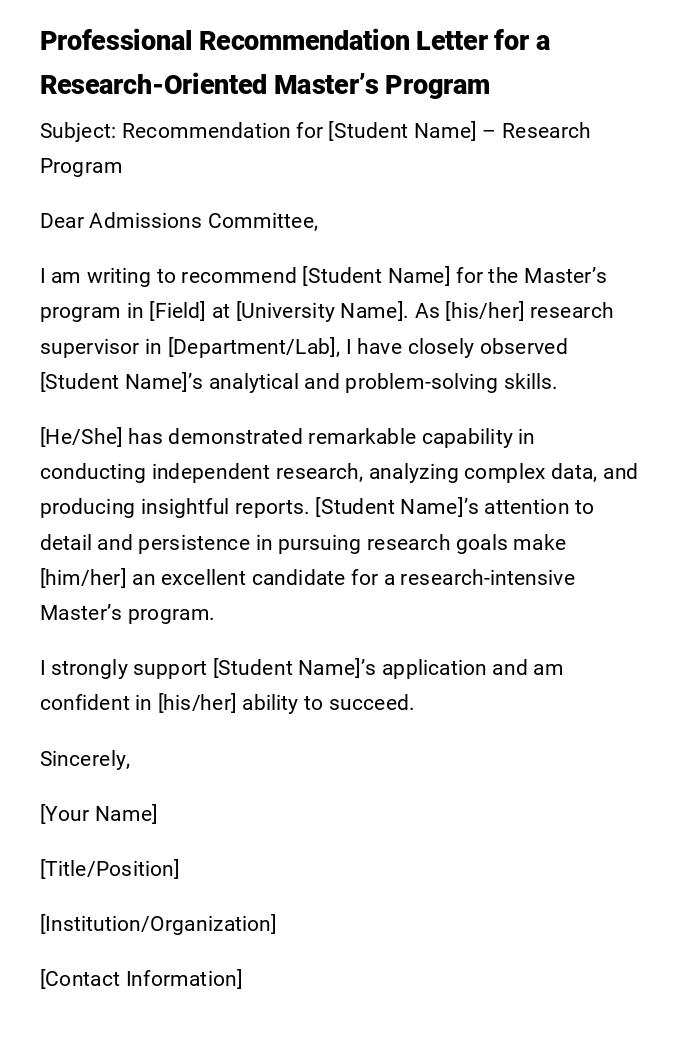
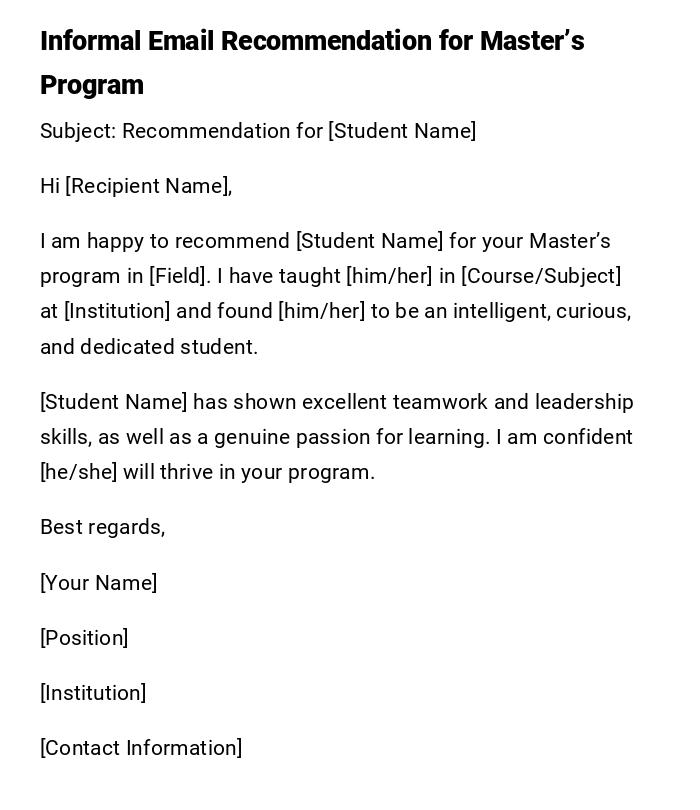
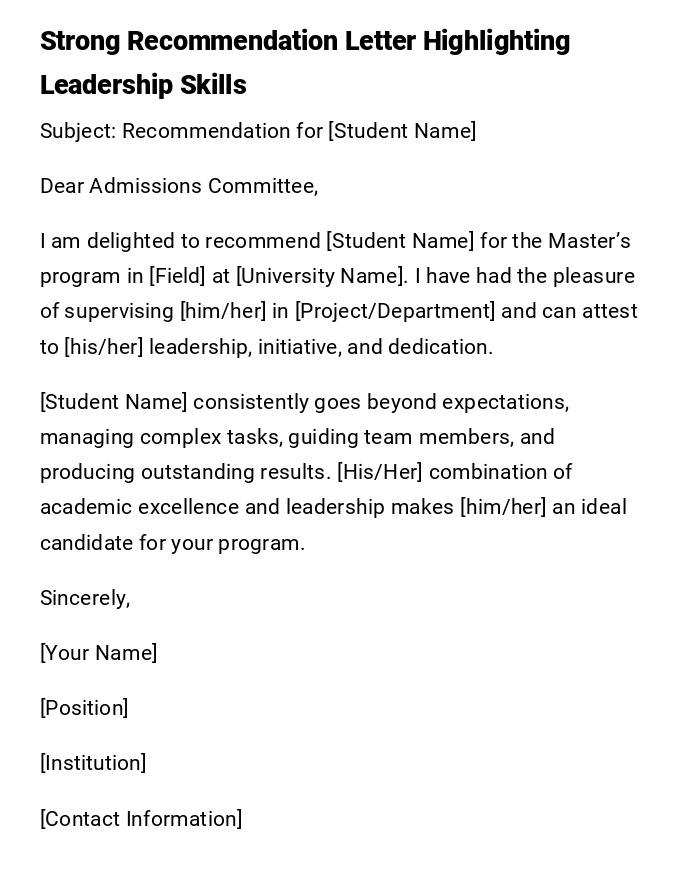
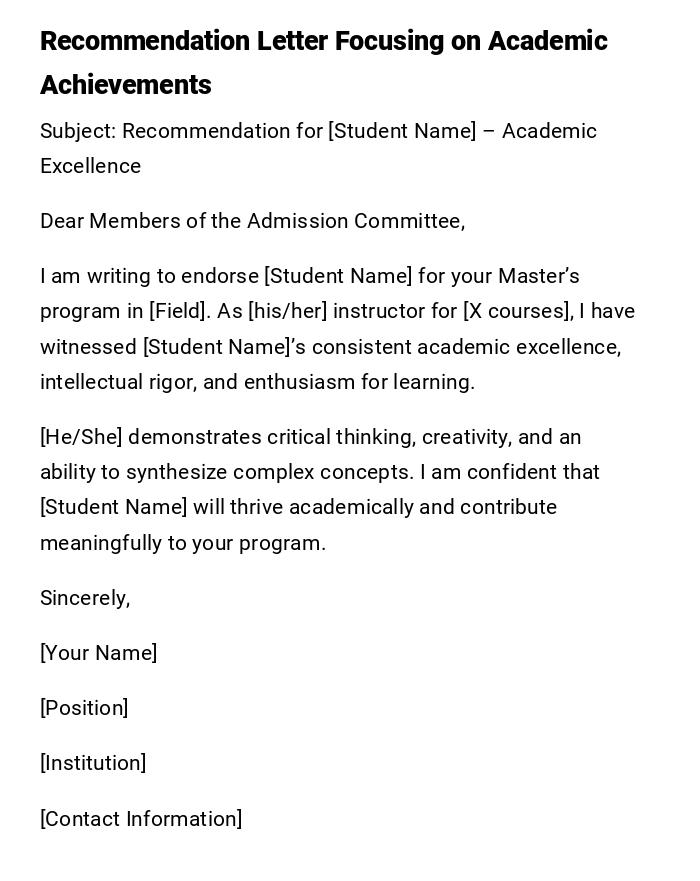

 Download Word Doc
Download Word Doc
 Download PDF
Download PDF